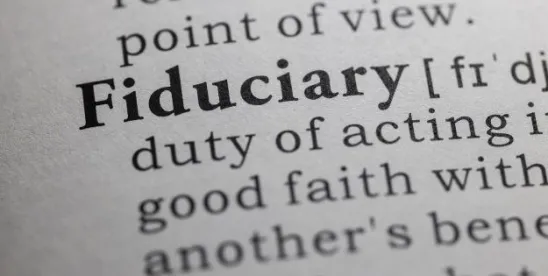In July, two Federal District Courts in Texas issued orders staying the effective date of the Department of Labor’s (DOL) fiduciary rule (Fiduciary Rule).1 The courts determined that the industry groups challenging the Fiduciary Rule are likely to succeed on the merits of their claim that the Fiduciary Rule conflicts with the Employee Retirement Income Security Act’s (ERISA) text and that the DOL exercised its regulatory power in an arbitrary and capricious manner. The Fiduciary Rule is an amendment to the regulation that defines when and whether a financial professional is acting as a fiduciary under ERISA and the Internal Revenue Code by virtue of providing nondiscretionary investment advice to participants in 401(k) plans, IRAs, and similar clients. The Fiduciary Rule also includes amendments to several prohibited transactions exemptions (PTEs), including PTE 2020-02 and PTE 84-24. The amendments were scheduled to become effective in September. The court orders have the effect of indefinitely stopping the amendments from going into effect. 2
Current Status
Because of the court orders, the current standard for determining whether a financial professional is acting as a fiduciary under ERISA and the Internal Revenue Code in connection with providing nondiscretionary advice remains the five-part test from the DOL’s 1975 regulation. Under the five-part test, nondiscretionary investment advice is fiduciary advice if the person: (1) renders advice as to the value of securities or other property or makes recommendations as to the advisability of investing in, purchasing, or selling securities or other property; (2) on a regular basis; (3) pursuant to a mutual agreement, arrangement, or understanding with the plan or a plan fiduciary that; (4) the advice would serve as a primary basis for investment decisions with respect to plan assets; and that (5) the advice was individualized based on the particular needs of the plan. All five parts of the test must be met for a person to be deemed a nondiscretionary investment advice fiduciary.
A financial professional that is an ERISA fiduciary engages in a prohibited transaction if the financial professional uses its fiduciary authority to generate additional fees for itself or a person in whom the financial professional has an interest that may affect its best judgment as a fiduciary (e.g., an affiliate), unless a PTE applies. For example, advice to rollover a 401(k) account to an IRA managed by the advice provider would likely be prohibited unless the advice is structured to comply with an applicable PTE. To address this risk, many financial professionals rely on PTE 2020-02. The Fiduciary Rule would have amended the exemption’s conditions. Because of the court orders, parties relying on PTE 2020-02 should continue to comply with the current (non-amended) version of PTE 2020-02. The conditions include the following:
- Comply with certain impartial conduct standards, including providing advice that is in the best interest of the client;
- Implement and follow policies and procedures designed to ensure compliance with the impartial conduct standards;
- Acknowledge fiduciary obligations;
- Disclose services and material conflicts of interest;
- Disclose the reasons why a rollover recommendation is in the best interest of the client; and
- Conduct a retrospective review of compliance with the requirements of the PTE.
Similarly, because of the court orders, parties relying on PTE 84-24, 75-1, 77-4, 80-83 and 86-128 should continue to comply with the current (nonamended) versions of the exemptions.
Implications for Registered Investment Advisers, Brokers, and Other Financial Institutions
Many financial institutions structure aspects of their services as nondiscretionary fiduciary investment advice. For example, wealth management firms often treat interactions with clients and prospective clients regarding rollovers from workplace retirement plans to IRAs as fiduciary investment advice. Other financial institutions do so regarding nondiscretionary asset allocation advice and nondiscretionary advice regarding investing in proprietary investment funds. Unless one of the exemptions mentioned above is available, these firms rely on PTE 2020-02 to address possible prohibited transactions on account of using their fiduciary authority to begin receiving an investment management fee in connection with a rollover, to receive a higher investment management fee in connection with a change to a client’s asset allocation, or to begin receiving an investment management fee in connection with an investment in a proprietary investment fund. These firms may continue to rely, as needed, on the current version of PTE 2020-02 without the need to comply with the additional requirements that would have applied based on the amendments.
Alternatively, depending on the specific facts and circumstances, a financial institution may wish to structure its services so that the firm and its investment professionals are not providing fiduciary investment advice. These firms should take steps to mitigate risk of being deemed an investment advice fiduciary.3 For example, firms seeking to avoid status as an investment advice fiduciary generally have sought to eliminate the third and fourth prongs of the five-part test by obtaining a client’s written acknowledgment disclaiming a mutual understanding to provide fiduciary advice or to rely on particular advice or recommendations as a primary basis for client investment decisions. In addition, a firm may want to consider taking the position that isolated interactions with a retirement client regarding a rollover do not meet the regular basis prong of the five-part test.
Whether each of the prongs of the currently applicable five-part test and the conditions of PTE 2020-02 are met requires a careful examination of the facts and circumstances of each situation.
Footnotes
1 Federation of Americans for Consumer Choice v. DOL, No. 6:24-cv-163-JDK (E.D. Tex. July 25, 2024) (Federations of Americans) and American Council of Life Insurers v. DOL, No. 4:24-cv-482-O (N.D. Tex. July 26, 2024) (American Council of Life Insurers).
2 The court in Federations of Americans stayed the amendment to the definition of “investment advice” and PTE 84-24. The court in American Council of Life Insurers stayed all of the amendments that are part of the fiduciary rule (the amendment to the definition of “investment advice” as well as the amendments to PTEs 2020-02, 84-24, 75-1, 77-4, 80-83, 83-1 and 86-128). While speaking at an industry conference on 30 July 2024, a senior DOL official is reported to have said the DOL is having internal discussions to determine its next steps in connection with the Fiduciary Rule. Presumably, an appeal of the court orders is one of the steps under consideration.
3 Rollover and other recommendations made by a broker-dealer to a retail customer are subject to Regulation Best Interest under the Securities Exchange Act of 1934.






 />i
/>i

